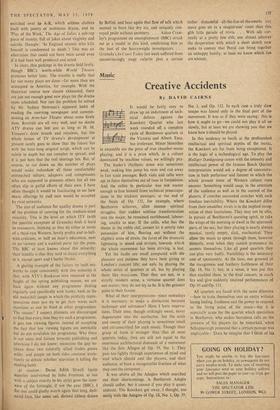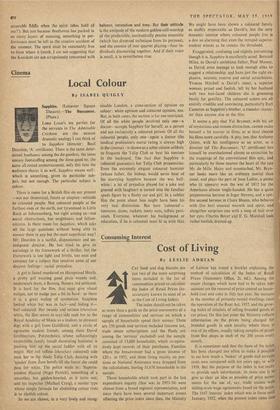Mu si c
Creative Accidents
By DAVID CAIRNS The leader's rhythmic sense was sometimes weak, making him jump his rests and run away in fast 'scale passages. Both viola and cello were apt to force themselves out of tune in fortissimos. And the cellist in particular was not master enough to free himself from technical preoccupa- tions in the trickiest passages; at the end of the finale of Op. 132, for example, where Beethoven achieves, after intense spiritual struggles, that sudden sublime transformation into the major, he remained earthbound, labour- ing, unable to soar. If the cello, who has the theme in the treble clef, cannot let it utterly take possession of him, floating, out without the slightest sense of strain, the force of the dramatic lightening in mood and texture, towards which the whole movement has been striving, is lost.
Yet the faults are small compared with the pleasure and purpose they have been giving to London's concert life; not only by playing the whole series of quartets at all, but by playing them like musicians. That they are not, in a strictly modern sense, a virtuoso quartet does not matter; they do not try to be. It is the greatest point in their favour.
What of their interpretations—since nowadays it is necessary to =Ice a distinction between technique and substance? Here I have reserva- tions. Their tone, though strikingly sweet, never degenerates into the saccharine, but the scale and sweep of their playing is sometimes small and circumscribed for such music. Though their grasp of form is stronger than that of most quartets today, they are still not equal to the enormous architectural demands of a movement like the first Allegro of Op. 59, No. 1. They pass too lightly through experiences of mind and soul which should cost the players, and their audience, at least a recognisable fraction of what they cost the composer.
It was above all the Adagios which searched out their shortcomings. A Beethoven Adagio should suffer; but it cannot if you play it quasi- andante. The Koeckert got away, I thought, too easily with the Adagios of Op. 18, No. 1, Op. 59, No. 1, and Op. 132. In each case a truly slow tempo was found only in the final part of the movement. It was as if they were saying: this is how it ought to go—we could not play it all so slowly, but at least we are showing you that we know how it should be played.
In this tendency to baulk at the profoundest intellectual and spiritual depths of the music, the Koeckert are far from being exceptional. it is the logic of a technological age. To play the Heiliger Dankgesang canon with the intensity and intellectual power of the famous Busch' Quartet interpretation would ask a degree of concentra- tion in both performer and listener to which the whole present tenor of Western culture runs counter. Something would snap, in the attention of the audience as well as in the control of the players, if crotchet succeeded crotchet with such timeless inevitability. Where the Koeckert differ from their smoother rivals is in the implied recog- nition of their limitations. They may not be able, in pursuit of Beethoven's questing spirit, to take the wings of the morning or dwell in the uttermost parts of the sea; but their playing is nearly always musical, rarely empty, slick, mechanical. They allow the music to speak through them, however distantly, even when they cannot pronounce its accents themselves. Like all good quartets they can play very badly. Variability is the necessary cost of spontaneity. At the time, one groaned at the meagreness and feathery feebleness of their Op. 18, No. 1; but, in a sense, it was just this that enabled them, in the final concert, to catch fire and give suddenly inspired performances of Op. 95 and Op. 131.
All quartets are faced with the same dilemma —how to train themselves into an entity without losing feeling, freshness and the power to respond to the living pulse of the music—but it is especially acute for the quartet which specialises in. Beethoven, who makes herculean calls on the prowess of his players (as he remarked, when Schuppanzigh protested that a certain passage was unplayable : 'Does he imagine that I think of his
miserable fiddle when the spirit takes hold of me?'). But just because Beethoven has packed in so many layers of meaning, something in per- formance must be left to the creative accident of the moment. The spirit must be reasonably free to blow where it listeth. I am not suggesting that the Koeckert are not scrupulously concerned with balance, intonation and tone. But their attitude is the antipode of the modern golden-calf-worship of the predictable, mechanically precise ensemble (which has divorced technique from its purpose), and the essence of real quartet playing—four in- dividuals discoursing together. And if their voice is small, it is nevertheless true.



































 Previous page
Previous page